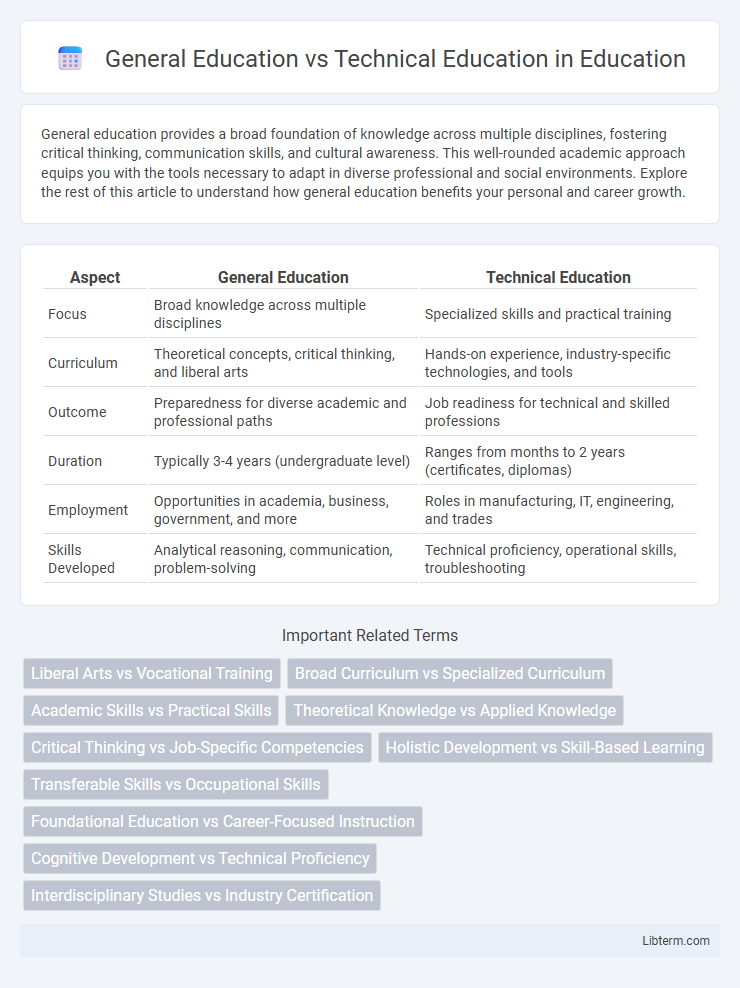General education provides a broad foundation of knowledge across multiple disciplines, fostering critical thinking, communication skills, and cultural awareness. This well-rounded academic approach equips you with the tools necessary to adapt in diverse professional and social environments. Explore the rest of this article to understand how general education benefits your personal and career growth.
Table of Comparison
| Aspect | General Education | Technical Education |
|---|---|---|
| Focus | Broad knowledge across multiple disciplines | Specialized skills and practical training |
| Curriculum | Theoretical concepts, critical thinking, and liberal arts | Hands-on experience, industry-specific technologies, and tools |
| Outcome | Preparedness for diverse academic and professional paths | Job readiness for technical and skilled professions |
| Duration | Typically 3-4 years (undergraduate level) | Ranges from months to 2 years (certificates, diplomas) |
| Employment | Opportunities in academia, business, government, and more | Roles in manufacturing, IT, engineering, and trades |
| Skills Developed | Analytical reasoning, communication, problem-solving | Technical proficiency, operational skills, troubleshooting |
Introduction to General and Technical Education
General education provides a broad foundation in multiple disciplines such as humanities, sciences, and social studies, fostering critical thinking and communication skills. Technical education emphasizes specialized training in fields like engineering, information technology, and healthcare, equipping students with practical skills aligned with industry demands. Both education types play crucial roles in workforce development, with general education promoting adaptability and technical education enhancing job-specific expertise.
Defining General Education
General education encompasses a broad curriculum designed to develop critical thinking, communication, and analytical skills across diverse disciplines such as humanities, social sciences, and natural sciences. It aims to provide students with foundational knowledge and intellectual flexibility, preparing them for lifelong learning and civic engagement. Unlike technical education, which focuses on specific vocational skills, general education fosters a well-rounded intellectual base applicable in various professional and personal contexts.
Understanding Technical Education
Technical education equips students with specialized skills and hands-on experience in fields like engineering, information technology, and healthcare, preparing them for direct entry into specific careers. It emphasizes practical training, industry standards, and the use of modern technology to enhance proficiency and employability. Understanding technical education reveals its role in addressing workforce demands and fostering innovation through skill development aligned with market needs.
Core Objectives of General Education
General education aims to develop critical thinking, communication skills, and ethical reasoning, providing a broad knowledge base that supports lifelong learning and adaptability. It fosters intellectual flexibility and cultural awareness, enabling individuals to engage effectively in diverse social and professional contexts. Emphasizing interdisciplinary understanding, general education prepares students to analyze complex problems and participate as informed citizens in a global society.
Key Features of Technical Education
Technical education emphasizes practical skills development, hands-on training, and industry-specific knowledge tailored to meet workforce demands. It incorporates specialized tools, technologies, and methodologies relevant to fields like engineering, IT, and healthcare, ensuring graduates are job-ready. Curriculums often integrate internships, certifications, and real-world problem-solving experiences to enhance employability and technical proficiency.
Curriculum Comparison: General vs Technical
General education curriculum emphasizes broad knowledge across humanities, sciences, and social studies, fostering critical thinking and communication skills. Technical education curriculum offers specialized instruction in fields such as engineering, information technology, and healthcare, focusing on practical skills and industry-specific competencies. The technical curriculum integrates hands-on training and real-world applications, while general education promotes interdisciplinary understanding and adaptable learning.
Career Opportunities: General vs Technical Paths
General education builds critical thinking, communication, and problem-solving skills applicable across various industries, enhancing adaptability in diverse career roles. Technical education offers specialized knowledge and hands-on experience in specific fields such as engineering, IT, or healthcare, leading to targeted job opportunities with potentially higher starting salaries. Choosing between general and technical paths depends on career goals, with general education providing broad opportunities and technical education focusing on niche areas demanding specific expertise.
Skill Development in Both Educational Streams
General education fosters critical thinking, communication, and broad analytical skills that enhance adaptability across multiple fields, while technical education emphasizes specialized competencies and practical skills tailored to specific industries. Skill development in general education encourages cognitive flexibility and problem-solving abilities applicable to diverse career paths, whereas technical education provides hands-on training and industry-relevant expertise critical for immediate employment. Both streams contribute to workforce readiness by balancing theoretical knowledge with applied skills, optimizing individual career prospects and economic productivity.
Societal Impact of General and Technical Education
General education fosters critical thinking, cultural awareness, and adaptable skills that promote civic engagement and social cohesion within diverse communities. Technical education drives economic growth by equipping individuals with specialized competencies essential for innovation, workforce development, and addressing industry-specific challenges. Together, these educational pathways balance societal needs by enhancing both informed citizenship and practical expertise.
Choosing the Right Path: Factors to Consider
Choosing between general education and technical education hinges on career goals, learning preferences, and industry demands. General education fosters critical thinking and broad knowledge applicable to diverse fields, while technical education offers specialized skills for specific trades or technologies. Evaluating job market trends, personal aptitude, and long-term growth opportunities ensures an informed decision tailored to individual success.
General Education Infographic

 libterm.com
libterm.com